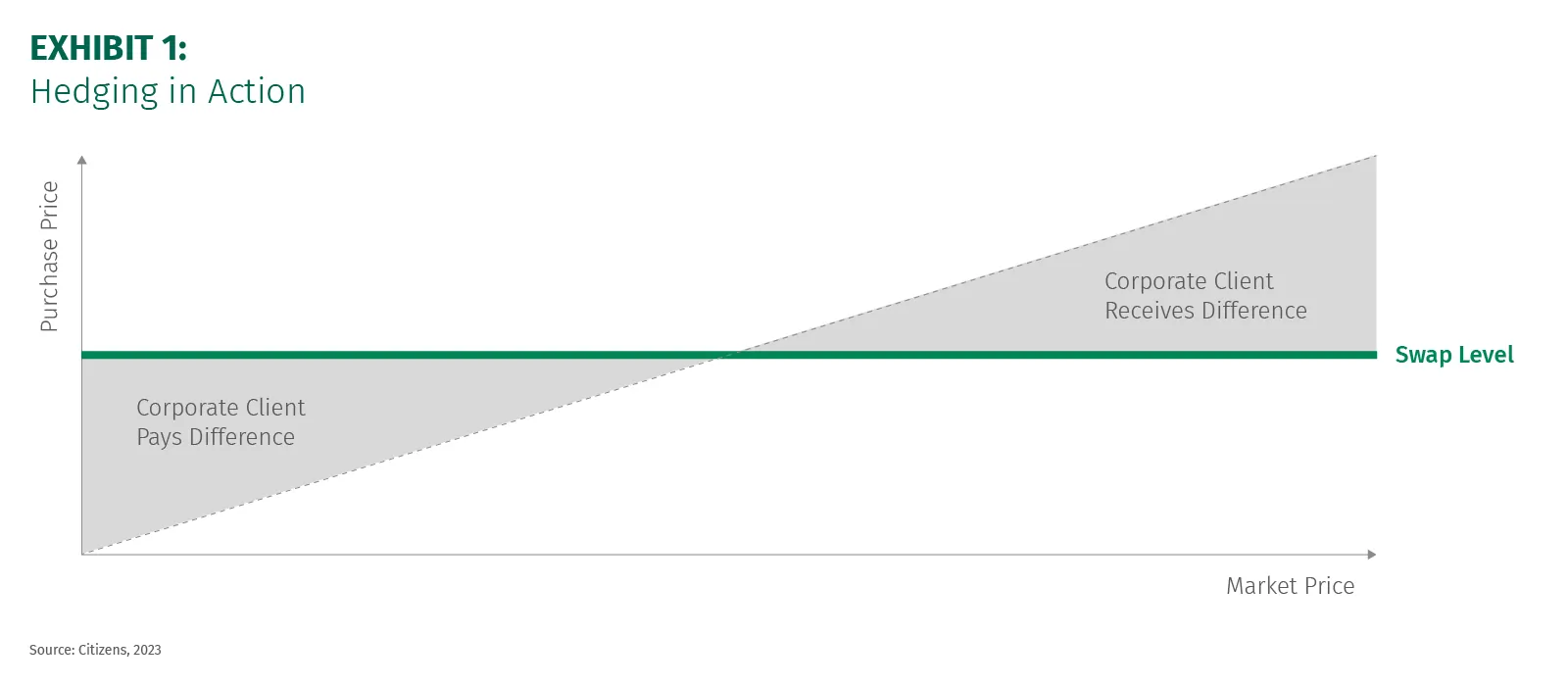
Published October 2023
Download a print-friendly version of this article.
Many domestic and international companies have experience hedging their interest rate and foreign exchange risk. But historically, there hasn't been a similar focus on metals hedging, as prices were relatively stable and modest increases could be passed along to customers. However, these circumstances changed drastically during the global pandemic, as supply chains buckled, inflation rose and raw material prices soared. This volatility only escalated with Russia's invasion of Ukraine, causing a surge in prices, and exposing major weaknesses in the way companies managed their metals risk. As a result, many companies who had not considered hedging before are taking a closer look.
Rich Aidala, Managing Director and Co-Head of Global Markets, and Anne Magauran, on the Citizens Global Markets Commodities desk, recently discussed how companies can leverage metals hedging to improve their risk management.
What companies should consider metals hedging?
Rich: Many types of companies could consider hedging, but for those companies that use significant amounts of metals — including base metals such as aluminum, copper, nickel, zinc and tin - hedging is essential in a volatile supply and pricing environment. Some obvious examples would include steelmakers, industrial manufacturers, automakers and beverage companies.
How does hedging help?
Anne: For industries with exposure to commodity costs, metals price volatility can have a significant impact on their bottom lines. Commodity hedging can help to proactively mitigate this risk by providing a level of price predictability that aids in budgeting, financial planning and overall risk management.
Who is typically responsible for hedging at a company?
Rich: This varies by company. The CFO or Treasurer is usually responsible for devising and approving a company's hedging strategies. Larger companies might have an entire team dedicated to hedging. At other companies, the CFO or Treasurer might also be responsible for executing the hedging strategy. Fortunately, many companies considering metals hedging today have experience with interest rate and foreign exchange hedging. That's a good base of knowledge to build upon.
What should a company think about when developing a hedging approach?
Anne: When designing a hedge strategy, a company should consider factors such as exposure to price fluctuations, overall risk tolerance and market conditions. It should consider the potential impact of price volatility on profit margins and determine which hedging tools best align with the company's overall risk management strategy. Always remember that hedging is not a way to win a market bet; the goal is to use hedging as a tool to mitigate risk, build profit and increase certainty.
What are some other considerations?
Rich: We recommend companies take a long-term view on when and how long they should hedge metals risk. Are the needs cyclical or steady? Some other considerations include availability and liquidity of hedging instruments, historical prices and volatility and overall firm strategy. Ultimately, each company's hedging strategy should be tailored to its specific circumstances and aligned with its overall risk management strategy and policy.
Could you describe a hedge in action?
Anne: Consider a beverage company that purchases aluminum for can manufacturing. The price it pays suppliers is typically linked to an underlying index, such as the London Metal Exchange (LME) aluminum contract. As the price of the LME contract fluctuates, the company's aluminum costs move proportionally. If the company forecasts their future materials needs, it may consider purchasing a commodity swap from Citizens to hedge against aluminum price hikes. At the end of each contract month, the swap settles and payment is exchanged between the two counterparties. If the average of that month's daily settlement prices is higher than the swap level, Citizens pays the company the difference, compensating it for the increased purchase price (see Exhibit 1). Conversely, if the average settlement price is below the swap level, the company pays the bank the difference. In both cases, the company has locked in aluminum spend for the upcoming months, reducing price risk and facilitating budgeting and forecasting.

Once a hedge is in place, does anything else need to be done?
Rich: That's a great question — and an important point to clarify. Companies do need to monitor their hedges regularly to ensure they are efficient and continue to align with the company's strategy. It's also important to keep tabs on market developments to evaluate opportunities for hedging optimizations.
Is hedging a defensive strategy?
Anne: While price protection is part of the equation, the strategic aspect of identifying opportunities and enhancing financial stability is equally important. Hedging can help management focus on its core business operations and growth strategy, rather than market volatility. Additionally, hedging can be used strategically to capitalize on favorable opportunities.
Key takeaways
- Companies that use significant amounts of metals in their operations may want to consider implementing a hedging strategy for price certainty.
- A hedging strategy protects revenue and profit margins, minimizes cash flow volatility, and creates greater budget predictability.
- Having a hedging strategy creates a competitive advantage by allowing a company to extend more stable pricing to its customers.

2023 M&A outlook: second half perspectives
While economic uncertainty remains, green shoots of optimism are beginning to appear. Citizens Capital Markets & Advisory experts preview what they expect could be in store for the rest of 2023.

How disinflation could affect company financing
Take a closer look at disinflation and its impact on capital markets through the history of debt and equity issuance and key considerations for companies as they approach capital financing.

Manage price volatility with hedging strategies
Changes in commodity prices can adversely impact companies across industries in complex ways, limiting profit margins and creating financial uncertainty. Learn how to reduce your exposure to commodity price risk.
Ready to take the next step? Get in touch with our team.
All fields are required unless marked as "Optional".
© Citizens Financial Group, Inc. All rights reserved. Citizens Bank, N.A. Member FDIC
“Citizens” is the marketing name for the business of Citizens Financial Group, Inc. (“CFG”) and its subsidiaries. “Citizens Capital Markets & Advisory” is the marketing name for the investment banking, research, sales, and trading activities of our institutional broker-dealer, Citizens JMP Securities, LLC (“CJMPS”), Member FINRA and SIPC (See FINRA BrokerCheck and SIPC.org). Securities products and services are offered to institutional clients through CJMPS. (CJMPS disclosures and CJMP Form CRS). Banking products and services are offered through Citizens Bank, N.A., Member FDIC. Citizens Valuation Services is a business division of Willamette Management Associates, Inc. (a wholly owned subsidiary of CFG).
Securities and investment products are subject to risk, including principal amount invested and are: NOT FDIC INSURED · NOT BANK GUARANTEED · MAY LOSE VALUE
